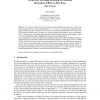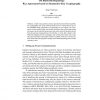50 search results - page 3 / 10 » Computational soundness for key exchange protocols with symm... |
107
click to vote
TCC
2007
Springer
15 years 8 months ago
2007
Springer
We prove a computational soundness theorem for symmetric-key encryption protocols that can be used to analyze security against adaptively corrupting adversaries (that is, adversar...
134
click to vote
ACNS
2009
Springer
15 years 8 months ago
2009
Springer
We enrich the classical notion of group key exchange (GKE) protocols by a new property that allows each pair of users to derive an independent peer-to-peer (p2p) key on-demand and ...
130
Voted
CEC
2008
IEEE
15 years 8 months ago
2008
IEEE
—This paper presents an eavesdropper-proof algorithm that is capable of fast generating symmetric (secret) keys. Instead of literally exchanging secret keys, both the sender and ...
157
click to vote
CISC
2005
Springer
15 years 7 months ago
2005
Springer
Abstract. Despite many good (secure) key agreement protocols based on publickey cryptography exist, secure associations between two wireless devices are often established using sym...
129
click to vote
CRYPTO
2003
Springer
15 years 7 months ago
2003
Springer
Abstract. A significant effort has recently been made to rigorously relate the formal treatment of cryptography with the computational one. A first substantial step in this dire...


